Introduction
Can Rabbits eat Swiss chard? Let’s find out.
Who would have thought that Swiss chard could be the secret ingredient to keeping our floppy-eared companions healthy and disease-free?
Picture this: vibrant colors, crisp leaves, and a burst of nutrition that your rabbit will absolutely adore. Swiss chard is not just another pretty face in the vegetable world – it’s a nutritional powerhouse that can make a real impact on your rabbit’s health.
So, grab your carrot (or should I say Swiss chard?) and let’s jump into the exciting world of rabbit nutrition!
I will not only introduce you to the wonders of Swiss chard but also guide you through the step-by-step process of safely introducing it to your bunny’s diet. We’ll cover everything from preparing Swiss chard to monitoring your rabbit’s reaction to ensure their health and happiness.
So, if you’re ready to take your rabbit’s meals to the next level, join me on this adventure. We’ll explore the goodness of Swiss chard, learn how to safely introduce it, and discover new ways to make mealtime the highlight of your bunny’s day.
Let’s hop to it, my fellow rabbit enthusiasts!
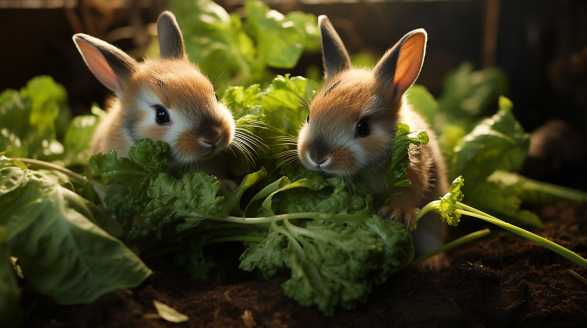
Key Takeaways
- Swiss chard is a nutritious leafy green vegetable that can benefit rabbits in many ways.
- It is high in fiber, which aids in digestion and prevents gastrointestinal issues in rabbits.
- Swiss chard is a rich source of vitamins A, C, and K, which support the immune system and overall health.
- The vegetable is also high in minerals like potassium, magnesium, calcium, and iron, which contribute to bone health and prevent deficiencies.
- Incorporating Swiss chard into a rabbit’s diet can help prevent diseases and promote optimal well-being.
- It is important to introduce Swiss chard gradually, choose fresh and organic options, and provide variety in their diet.
- Moderation is key, and consulting with a veterinarian is always recommended for personalized advice.
How to Safely Introduce Swiss Chard to Your Rabbit
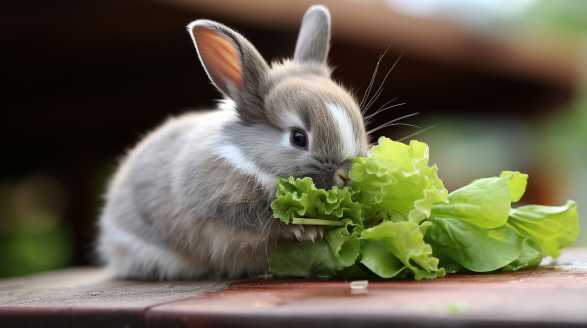
As a rabbit owner, you are always on the lookout for new and healthy vegetables to incorporate into your furry friend’s diet. Swiss chard is not only a nutritious option, but it also adds a pop of vibrant color to your rabbit’s meals.
I will guide you through the process of safely introducing Swiss chard to your rabbit, ensuring their health and happiness.
Why Swiss Chard?
Swiss chard is an excellent addition to your rabbit’s diet due to its abundant nutritional benefits. This leafy green vegetable is packed with essential vitamins and minerals including Vitamin A, Vitamin K, Vitamin C, Calcium, and Fiber.
Preparing Swiss Chard
Before offering Swiss chard to your rabbit, it’s crucial to properly prepare it to ensure your furry friend’s safety. Follow these simple steps:
- Select fresh Swiss chard: Choose vibrant, crisp leaves that are free from any browning or wilting.
- Wash thoroughly: Rinse the Swiss chard under cool running water, removing any dirt or debris. Ensure there are no pesticide residues by opting for organic produce.
- Remove excess moisture: Shake off excess water or gently pat the leaves dry using a clean towel. It’s important to avoid feeding damp greens to your rabbit, as it can lead to digestive issues.
Rabbits have sensitive digestive systems that require a gradual transition when introducing new foods. Follow these steps for a safe introduction of Swiss chard:
- Start with small amounts: Begin by offering a small piece of Swiss chard, roughly the size of your rabbit’s ear. This allows their digestive system to adjust gradually.
- Observe for any adverse reactions: Monitor your rabbit closely after their first taste of Swiss chard. Look for any signs of discomfort, such as diarrhea or excessive gas. If any negative symptoms occur, remove the Swiss chard from their diet immediately.
- Increase portion size gradually: If your rabbit shows no adverse reactions, slowly increase the portion size over the course of several days. This will give their digestive system time to acclimate.
- Variety is key: While Swiss chard is a healthy addition, it’s important to maintain a balanced diet. Introduce other rabbit-safe vegetables alongside Swiss chard to provide a variety of nutrients.
Feeding Guidelines
Now that your rabbit has become accustomed to Swiss chard, here are some feeding guidelines to ensure their safety and maintain a healthy diet:
- Serve in moderation: Swiss chard should be offered as a treat and not as a primary food source. Aim for a maximum of two to three times per week, with small portions each time.
- Mix with other greens: Combine Swiss chard with other rabbit-safe vegetables such as romaine lettuce, cilantro, or parsley. This helps diversify their diet and prevent boredom.
- Avoid a sudden change: If you decide to remove Swiss chard from your rabbit’s diet temporarily, do so gradually to prevent any digestive issues.
- Monitor your rabbit’s weight: Like humans, rabbits can gain weight if they consume too many calorie-rich foods. Regularly check your rabbit’s weight and adjust their diet accordingly.
Introducing Swiss chard to your rabbit’s diet can add both color and nutrition to their meals. By following the steps outlined in this article, you can safely introduce this leafy green vegetable to your furry friend without any digestive disruptions.
Your rabbit will thank you with binkies and happy hops!
Creative Recipes: Incorporating Swiss Chard in Your Rabbit’s Meals
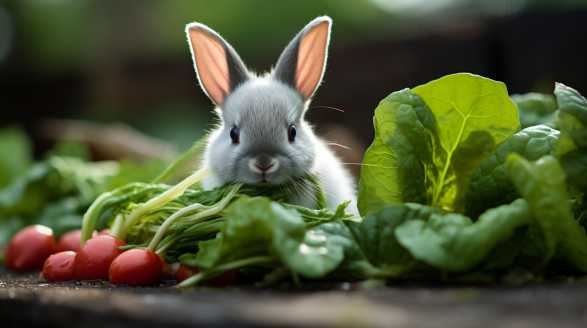
As a devoted rabbit owner, I am constantly on the lookout for new ways to keep my fluffy friend happy and healthy. One ingredient that has recently caught my attention is Swiss chard.
I will share with you some creative recipes that you can try to incorporate Swiss chard into your rabbit’s diet.
Why Swiss Chard?
Swiss chard is an excellent choice for rabbits due to its high nutritional content. It is rich in vitamins A, C, and K, as well as antioxidants and fiber.
The Basics: Preparing Swiss Chard
Before diving into the exciting recipes, it’s essential to know how to prepare Swiss chard properly:
- Choose fresh and organic Swiss chard from your local market or grow it in your garden if you have green thumbs.
- Rinse the Swiss chard thoroughly under cold water to remove any dirt or debris.
- Remove the tough stems, as they can be difficult for rabbits to chew and digest.
- Chop the leaves into bunny-sized pieces.
Now that you have a firm foundation, let’s explore some creative recipes that will make your rabbit’s taste buds dance!
Recipe 1: Swiss Chard Salad Delight
Ingredients:
- A handful of fresh, chopped Swiss chard leaves
- A few slices of crisp cucumber
- 1 small carrot, shredded
- A few sprigs of fresh parsley
- A sprinkle of dried chamomile flowers
Instructions:
- Combine the Swiss chard leaves, cucumber slices, shredded carrot, and fresh parsley in a bowl.
- Sprinkle with dried chamomile flowers for an extra burst of flavor.
- Serve the salad as a refreshing treat for your rabbit, making sure to remove any uneaten portions after a few hours.
Recipe 2: Swiss Chard Hay Stack
Ingredients:
- A generous handful of fresh Swiss chard leaves
- A handful of fresh timothy hay
Instructions:
- Lay a bed of timothy hay in your rabbit’s feeding area.
- Place the Swiss chard leaves on top of the hay in an attractive stack.
- Watch your rabbit joyfully munch away at the delicious combination of hay and Swiss chard.
Recipe 3: Bunny’s Swiss Chard Smoothie
Ingredients:
- 1 small banana
- A handful of fresh Swiss chard leaves
- 1/4 cup of water
Instructions:
- Blend the banana and Swiss chard leaves together with water until smooth.
- Pour the smoothie into your rabbit’s bowl and watch them lap it up with delight.
- Feel free to experiment with other rabbit-safe fruits and vegetables to create different flavors.
Recipe 4: Swiss Chard Stir-Fry Surprise
Ingredients:
- A handful of fresh Swiss chard leaves
- A small handful of fresh basil leaves
- 1/4 cup of grated carrot
- 1 tablespoon of olive oil
- A sprinkle of dried dandelion leaves
Instructions:
- Heat the olive oil in a pan over medium heat.
- Add the Swiss chard leaves, basil leaves, and grated carrot to the pan, and stir-fry for a few minutes until wilted.
- Remove from heat and sprinkle with dried dandelion leaves for an extra punch of flavor.
- Allow the stir-fry to cool before serving it as a nutritious meal for your rabbit.
Incorporating Swiss chard into your rabbit’s meals can provide them with a burst of nutrients while adding a touch of creativity to their dining experience. Remember to introduce new foods gradually and observe your rabbit’s reaction to ensure they enjoy the recipes you create.
Note: Always consult with your veterinarian before introducing new foods into your rabbit’s diet to ensure they are safe and suitable for their individual needs.
Swiss Chard Allergy in Rabbits: Causes and Management
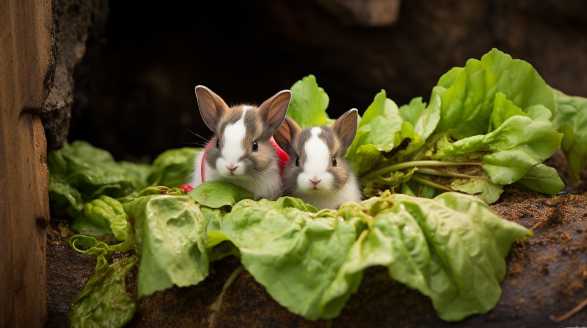
As a rabbit owner, I am always looking for ways to keep my furry friends healthy and happy. One thing that came as a surprise to me is that rabbits can have allergies, just like humans!
I will explore the causes and management of this unique allergy.
What is Swiss Chard Allergy?
Swiss chard, a leafy green vegetable with colorful stalks, is often considered a healthy addition to a rabbit’s diet. However, some rabbits can develop an allergic reaction to Swiss chard, which can range from mild to severe.
Causes of Swiss Chard Allergy
- Sensitivity to Oxalates: Swiss chard contains oxalates, which can cause allergies in rabbits. Some rabbits may have a higher sensitivity to oxalates than others, leading to an allergic reaction.
- Individual Immune System Response: Like humans, rabbits have individual immune system responses. While most rabbits handle Swiss chard well, some may have an overactive immune response, leading to an allergic reaction.
- Genetic Predisposition: Certain rabbit breeds may have a genetic predisposition to developing allergies, including Swiss chard allergy. If you have a rabbit breed known to be prone to allergies, it’s essential to be cautious when introducing new foods like Swiss chard.
- Previous Allergies: If your rabbit has a history of allergies, they may be more prone to developing a Swiss chard allergy. Pay attention to any previous allergic reactions your rabbit may have had and take precautions accordingly.
Symptoms of Swiss Chard Allergy
Identifying the symptoms of Swiss chard allergy can help you manage your rabbit’s health effectively. Here are some common symptoms to look out for:
- Digestive Issues: Diarrhea, soft stool, or changes in bowel movements can indicate a digestive reaction to Swiss chard.
- Skin Irritation: Redness, itchiness, or rash on the skin can be signs of an allergic reaction.
- Respiratory Problems: Sneezing, wheezing, or difficulty breathing may occur if your rabbit is having an allergic reaction to Swiss chard.
- Behavioural Changes: Symptoms such as lethargy, decreased appetite, or general discomfort may suggest an allergic reaction to Swiss chard.
Managing Swiss Chard Allergy
Now that we are aware of the causes and symptoms of Swiss chard allergy, let’s dive into the management of this condition. Remember, always consult with a veterinarian before making any significant changes to your rabbit’s diet or treatment plan.
- Elimination: If you suspect your rabbit has a Swiss chard allergy, eliminate it from their diet immediately. Replace it with other suitable leafy greens that are safe for rabbits.
- Observation: Monitor your rabbit’s symptoms closely after removing Swiss chard from their diet. If the symptoms subside and your rabbit’s health improves, it is likely that Swiss chard was the cause of the allergy.
- Allergy Testing: If you want to confirm the Swiss chard allergy or suspect other allergies, consult with a veterinarian who can conduct allergy testing. This will help identify specific allergens affecting your rabbit.
- Alternative Greens: Replace Swiss chard with other rabbit-safe leafy greens, such as romaine lettuce, kale, parsley, or cilantro. Introduce them gradually to ensure your rabbit tolerates them well.
- Proper Diet Balance: Provide a well-balanced diet for your rabbit to support their overall health. Consult with a veterinarian to determine the best combination of greens, hay, and pellets for your rabbit’s specific needs.
- Professional Guidance: Seek professional guidance from a rabbit-savvy veterinarian to determine the most suitable diet and management plan for your rabbit’s unique situation.
Swiss chard allergy in rabbits can cause discomfort and health issues. By understanding the causes, recognizing the symptoms, and implementing proper management techniques, you can ensure the well-being of your rabbit.
With the right care, your furry friend will be happy and healthy, free from Swiss chard allergies.
Swiss Chard vs. Other Leafy Greens for Rabbits: Which is Best?
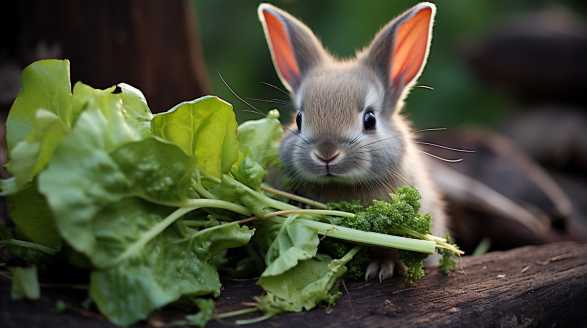
As a rabbit owner, I am always on the lookout for the best foods to nourish and delight my furry friends. When it comes to leafy greens, Swiss chard and other options might leave you wondering which one is the ultimate choice for your bunnies.
Let’s jump right in!
The Power of Leafy Greens for Rabbits
Leafy greens are a crucial part of a rabbit’s diet. Packed with essential vitamins, minerals, and fiber, they promote a healthy digestive system, strong bones, and overall well-being.
Benefits of Swiss Chard for Rabbits
Swiss chard, with its vibrant green leaves and colorful stalks, is a popular choice among rabbit owners for several reasons:
- Nutritional Value: Swiss chard is a nutritional powerhouse. It contains high levels of fiber, which aids in digestion and prevents stasis, a potentially life-threatening condition for rabbits. Additionally, it is rich in vitamins A, C, and K, as well as minerals like potassium and calcium.
- Hydration: Swiss chard has a high water content, which helps keep your rabbit hydrated. Proper hydration is vital for maintaining a healthy urinary tract and preventing urinary tract infections, a common issue in rabbits.
- Variety: Rabbits enjoy a diverse diet, just like humans do. Swiss chard provides a change in taste and texture, making mealtime more exciting for your furry companion.
Alternatives to Swiss Chard
While Swiss chard has its merits, it is essential to introduce a variety of leafy greens into your rabbit’s diet to ensure they receive a well-rounded nutritional profile. Here are some other leafy greens you can include:
1. Romaine Lettuce
Romaine lettuce is a popular leafy green choice among rabbit owners due to its high water content and low levels of oxalic acid. It is a safe and refreshing option that offers hydration and contributes to a healthy diet.
2. Kale
Kale is another leafy green that rabbits can enjoy in moderation. Rich in vitamins A and K, as well as calcium, it promotes eye health and good bone density.
3. Spinach
Spinach is often a go-to choice for many pet owners, but it should be served in limited quantities. Although spinach is nutrient-dense and contains vitamins A, C, and K, it also contains high levels of oxalates, which can hinder calcium absorption and potentially lead to bladder stones.
4. Arugula
Arugula is a flavorful leafy green that rabbits find enticing. It is low in oxalates and high in vitamin C, making it a suitable addition to their diet.
5. Bok Choy
Bok choy is a member of the cabbage family and a safe choice for rabbits. It is rich in antioxidants, vitamins A, C, and K, and minerals like calcium and iron.
Choosing the best leafy greens for your rabbits can be perplexing given the many options available. While Swiss chard offers an array of health benefits and serves as a fantastic addition to their meals, it is crucial to vary their diet with other leafy greens to ensure optimal nutrition.
Remember to introduce new greens gradually to your rabbits’ diet and monitor their response. Each rabbit may have individual preferences and sensitivities, so it is essential to observe how they react to different options.
Incorporating a mix of Swiss chard, romaine lettuce, kale, spinach, arugula, and bok choy into your rabbit’s diet will provide a diverse range of nutrients and flavors, making mealtime exciting and fulfilling. Your furry friends will appreciate the burst of flavors and textures, and you will have peace of mind knowing you are nurturing them with the best leafy greens available.
The Impact of Swiss Chard on a Rabbit’s Digestive System
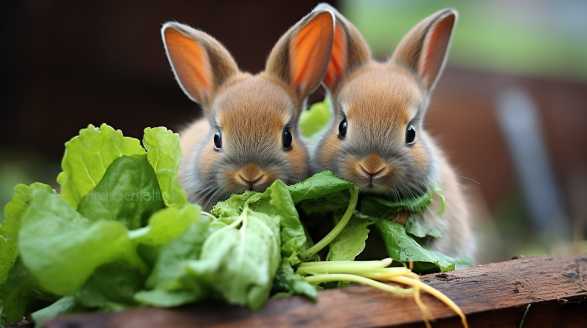
Rabbits are adorable creatures that make great pets. As a rabbit enthusiast, I’ve always been intrigued by their unique digestive system and how certain foods can affect their health.
we will explore the impact of Swiss chard on a rabbit’s digestive system and why it should be included in their diet.
Swiss chard, also known as “silverbeet,” is a leafy green vegetable that belongs to the Chenopodiaceae family. Its vibrant colored stems and large, dark green leaves make it an appealing addition to any garden or plate.
These attributes make Swiss chard an ideal choice for promoting overall health in rabbits.
Improved Digestion with Swiss Chard
Swiss chard’s high fiber content is a boon for a rabbit’s digestive system. Rabbits are herbivores and require a diet primarily composed of fiber to maintain a healthy gut.
This ensures a healthy balance of microorganisms in the gut, which promotes optimal digestion and nutrient absorption.
Essential Nutrients in Swiss Chard
Swiss chard is a nutritional powerhouse for rabbits due to its excellent nutrient profile. Here are some of the key nutrients found in Swiss chard and their benefits:
- Vitamin A: Swiss chard contains high levels of vitamin A, which is vital for maintaining good eyesight and a healthy immune system in rabbits.
- Vitamin C: This potent antioxidant supports overall health by boosting the immune system and promoting healthy connective tissues.
- Vitamin K: Swiss chard is abundant in vitamin K, which aids in blood clotting and strengthens bones in rabbits.
- Calcium: Essential for strong bones and teeth, calcium is a critical mineral that can prevent dental problems and osteoporosis in rabbits.
- Magnesium: Swiss chard contains magnesium, which plays a crucial role in muscle and nerve function, promoting overall well-being in rabbits.
- Iron: Iron is essential for the production of red blood cells, and consuming Swiss chard can help prevent anemia and promote optimal oxygen transport in a rabbit’s body.
Preparing Swiss Chard for Rabbits
To ensure the safety and maximum benefit of Swiss chard for your furry friend, follow these steps:
- Proper washing: Thoroughly rinse Swiss chard under cool water to remove any dirt or pesticides that may be present. This step is crucial in maintaining your rabbit’s health.
- Trimming: Remove the tough stems from the Swiss chard leaves as they can be difficult for rabbits to chew and digest. Focus on providing the soft, leafy greens to your rabbit.
- Portion control: Introduce Swiss chard gradually to your rabbit’s diet. Start with small pieces to prevent digestive upset and carefully observe your rabbit’s reaction.
Incorporating Swiss Chard into Your Rabbit’s Diet
Now that we understand the positive impact Swiss chard can have on a rabbit’s digestive system, let’s explore some ways to incorporate this leafy green into their diet:
- Mix it up: Add a handful of chopped Swiss chard leaves to your rabbit’s daily serving of hay or fresh greens such as lettuce or kale. This will provide them with a variety of textures and flavors while enhancing their nutrient intake.
- Healthy treats: Treat your rabbit with bite-sized Swiss chard pieces during training sessions or as a reward for good behavior. Not only will they enjoy the taste, but it will also contribute to their overall well-being.
- Simmer and serve: Lightly steam or simmer Swiss chard leaves and serve them as a warm side dish alongside your rabbit’s regular pellets. This adds a fun culinary twist to their diet while maintaining their health.
Swiss chard is a remarkable addition to a rabbit’s diet, offering numerous health benefits and promoting a well-functioning digestive system. Its abundance of essential nutrients, fiber content, and versatility make it a go-to choice for rabbit enthusiasts.
Your rabbit will thank you with every hop!
Can Rabbits Have Too Much Swiss Chard? Finding the Right Balance
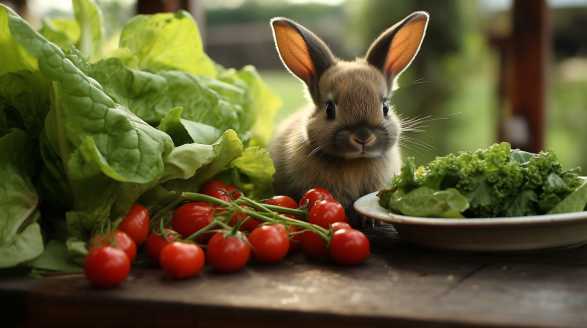
As a rabbit owner, I’ve always wondered if there’s such a thing as too much Swiss chard in my furry friend’s diet. Rabbits love their leafy greens, and Swiss chard is a nutritious and delicious option.
Join me as I look into the world of rabbits and Swiss chard to uncover the right balance for our furry companions.
The Nutritional Benefits of Swiss Chard
Swiss chard is a powerhouse of nutrition for rabbits. It is packed with essential vitamins and minerals that contribute to their overall well-being.
- Vitamin A: Essential for healthy eyesight and immune system function.
- Vitamin C: Helps boost your rabbit’s immune system and keeps their skin healthy.
- Vitamin K: Important for proper blood clotting and bone health.
- Calcium: Crucial for strong bones and teeth.
- Iron: Necessary for the production of red blood cells.
- Potassium: Helps maintain a healthy heart and supports proper muscle function.
The Importance of Balance
While Swiss chard offers a wide range of benefits, it’s crucial to remember that balance is key when introducing any new food into your rabbit’s diet. Rabbits have sensitive digestive systems, and sudden dietary changes can lead to gastrointestinal upset.
Monitor Your Rabbit’s Digestive Health
As responsible pet owners, it’s our duty to keep a close eye on our rabbits’ digestive health. Here are some signs to watch out for:
- Diarrhea: Loose stool is a common indicator of digestive upset in rabbits.
- Decreased appetite: If your bunny suddenly loses interest in food, there might be an issue.
- Changes in behavior: Watch out for lethargy or abnormal behavior, as it may indicate an upset stomach.
- Changes in fecal matter: Keep an eye on the size, shape, and color of your rabbit’s droppings.
To ensure your rabbit’s digestive system can handle Swiss chard, introduce it gradually into their diet. Follow these steps:
- Start with small quantities: Begin by offering tiny amounts of Swiss chard leaves.
- Monitor your rabbit’s reaction: Pay close attention to their digestion and overall behavior.
- Increase serving size gradually: If your rabbit tolerates Swiss chard well, you can gradually increase the serving size.
Factors to Consider
While it’s crucial to find the right balance of Swiss chard in your rabbit’s diet, several other factors may influence their tolerance and digestion:
Age
Young rabbits have more sensitive digestive systems compared to adult rabbits. If you have a young bunny, it’s essential to be even more cautious when introducing new foods.
Overall Health
If your rabbit has any pre-existing digestive issues, consult with a veterinarian before adding Swiss chard to their diet. They will be able to assess whether this leafy green is suitable for your furry friend.
Other Diet Components
Do not solely rely on Swiss chard as the primary component of your rabbit’s diet. A well-rounded diet should consist of a variety of vegetables, high-quality hay, and a limited amount of pellets.
Freshness and Quality
Always opt for fresh Swiss chard from reputable sources. Ensure that the leaves are vibrant and free from any signs of wilting or damage.
Moderation is Key
While Swiss chard has numerous benefits, it’s important to remember that moderation is key. Here’s how you can strike the right balance:
- Rotate greens: Instead of feeding Swiss chard every day, mix it up with other leafy greens like kale, romaine lettuce, and parsley.
- Monitor portion size: Limit the portion size of Swiss chard to avoid overfeeding.
- Observe your rabbit’s response: Regularly assess your rabbit’s overall health and digestion.
Rabbits can enjoy Swiss chard as part of a well-balanced diet, but it’s essential to find the right balance. By gradually introducing this leafy green, monitoring your rabbit’s digestive health, and considering other factors, you can ensure that Swiss chard becomes a delightful addition to your furry friend’s menu.
Happy feeding!
Rabbits and Swiss Chard: Exploring the Potential Risks
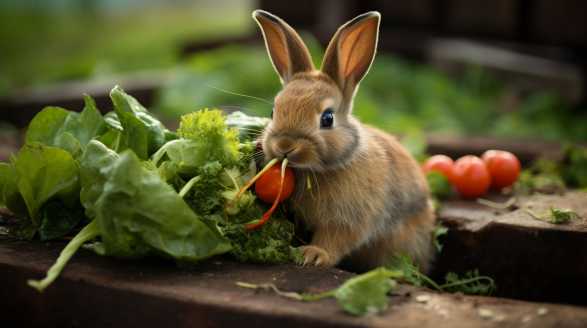
The Tempting Delicacy: Swiss Chard
Swiss chard, scientifically known as Beta vulgaris, is a leafy green vegetable that belongs to the same family as beets and spinach. Its vibrant leaves come in an array of colors, including green, red, yellow, and even rainbow varieties.
The Bunny’s Delight or Nightmare?
When I initially stumbled upon the idea of offering Swiss chard to my rabbits, I imagined their delighted munching sounds and wagging tails. However, my excitement subsided as I dug deeper into the potential risks associated with feeding Swiss chard to these fluffy companions.
1. Oxalates: The Double-Edged Sword
Swiss chard, like many other leafy greens, contains oxalates – naturally occurring compounds that can bind to calcium, creating calcium oxalate crystals. Although these crystals are harmless to humans, rabbits lack the ability to efficiently metabolize oxalates.
2. Gastrointestinal Upset
Rabbits have a delicate digestive system that requires a careful balance of nutrients. While Swiss chard is a valuable source of vitamins A, C, and K, feeding it in large quantities can disrupt the rabbit’s gut flora, resulting in diarrhea, bloating, or even severe gastrointestinal upset.
3. High Water Content
One might assume that the high water content of Swiss chard could be beneficial for hydration in rabbits. However, excessive moisture in their diet can disrupt the delicate balance of their digestive system, leading to softer stool, increased vulnerability to pathogens, and potential dehydration if not properly managed.
4. Chemical Contamination
As an avid gardener, I must consider potential chemical contamination that Swiss chard could harbor. Pesticides, herbicides, or other chemicals used in conventional farming can pose a risk not only to rabbits but to our own health as well.
The Balancing Act: Proper Nutrition for Rabbits
While Swiss chard poses potential risks, it does not mean rabbits should completely steer clear of all leafy greens. To ensure a balanced diet for our furry friends, it is vital to offer a variety of vegetables that meet their nutritional needs.
1. Leafy Greens
Providing a mixture of leafy greens like romaine lettuce, green leaf lettuce, or even small amounts of kale can offer rabbits the necessary nutrients without the risks posed by Swiss chard.
2. Fiber-Rich Vegetables
Vegetables high in fiber, such as carrot tops, parsley, and dandelion greens, are not only safe but also help maintain optimal dental health in rabbits by promoting proper wear and tear of their continuously growing teeth.
3. Hay: The Staple Diet
Hay is an essential component of a rabbit’s diet and should make up the majority of their food intake. Timothy hay, orchard grass, or other suitable hay varieties help maintain proper gut motility and provide the necessary roughage for healthy digestion.
4. Moderation Is Key
Just like humans, rabbits thrive on a varied and balanced diet. While it is important to incorporate vegetables into their meals, moderation is crucial to avoid overloading their digestion with excessive nutrients or moisture.
While Swiss chard may seem like an attractive addition to a rabbit’s diet, it is crucial to approach it with caution. The potential risks, including oxalates, gastrointestinal upset, high water content, and chemical contamination, cannot be overlooked.
Remember, a healthy and balanced diet is the key to keeping those furry tails wagging with joy!
So, let’s not leave our rabbits in a muddle of confusion, but instead, choose their nourishment wisely and enjoy the companionship they bring to our lives with utmost care and attention.
Is Swiss Chard Safe for Baby Rabbits?
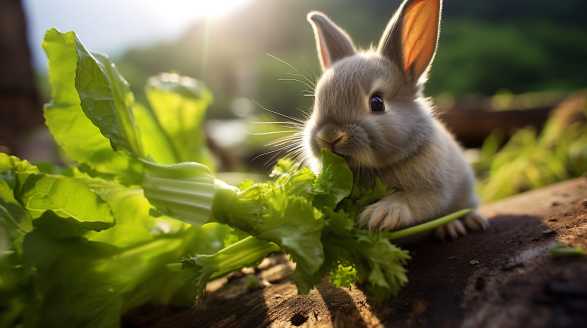
The Nutritional Value of Swiss Chard
Swiss chard is not only visually appealing but also packed with essential nutrients. Here is a breakdown of the key nutrients found in Swiss chard:
- Vitamin A: Swiss chard is an excellent source of vitamin A, which promotes healthy eyesight and overall immune function in baby rabbits.
- Vitamin C: This leafy green is also rich in vitamin C, which helps maintain healthy skin and supports the immune system.
- Calcium: Swiss chard is a good source of calcium, which is essential for strong bones and teeth in growing rabbits.
- Fiber: Just like other leafy greens, Swiss chard contains a significant amount of dietary fiber. Fiber aids digestion and supports a healthy gastrointestinal system in baby rabbits.
Introducing Swiss Chard to Baby Rabbits
When it comes to introducing any new food to baby rabbits, it is essential to do so gradually. Here are a few steps to follow:
- Age: Before introducing Swiss chard or any other leafy greens, ensure that your baby rabbit is at least 12 weeks old. Their digestive system needs time to develop properly before introducing vegetables.
- Start small: Begin by offering a small piece of Swiss chard, about the size of a rabbit’s ear, to gauge their tolerance and reaction.
- Observe: Carefully observe your baby rabbit for any adverse reactions such as diarrhea or changes in behavior. If any issues arise, discontinue feeding Swiss chard and consult a veterinarian.
- Increase gradually: If your baby rabbit shows no negative reactions, gradually increase the amount of Swiss chard over a few days.
Precautions to Consider
While Swiss chard can be a nutritious addition to your baby rabbit’s diet, there are a few precautions to keep in mind:
- Moderation is key: Swiss chard should be given as a treat or part of a balanced diet, along with hay, fresh water, and high-quality pellets. It should not replace the mainstays of a rabbit’s diet.
- Variety is important: Ensure that Swiss chard is only one of many vegetables offered to your baby rabbit. A diverse diet is crucial for their overall health and well-being.
- Organic is ideal: Whenever possible, opt for organic Swiss chard to minimize the risk of pesticide exposure.
To sum up, Swiss chard can be a safe addition to a baby rabbit’s diet, as long as it is introduced gradually and in moderation. Its high nutritional value makes it a worthy consideration for offering variety to your furry friend’s meals.
Enjoy watching your baby rabbit nibble on this vibrant and tasty leafy green!
The Benefits of Feeding Swiss Chard to Rabbits
When it comes to providing a healthy and nutritious diet for our beloved rabbits, it’s essential to include a wide variety of leafy greens. Swiss chard, with its vibrant colors and delicious taste, is an excellent addition to their diet.
I will look into the numerous advantages of incorporating Swiss chard into your rabbit’s diet, and share some valuable tips on feeding them this nutritious vegetable.
1. Abundance of essential nutrients
Swiss chard is a leafy green vegetable that is packed with an abundance of essential nutrients, making it an excellent choice for your rabbit’s overall health and well-being. This versatile vegetable contains significant amounts of vitamins A, C, and K. These vitamins are crucial for maintaining a strong immune system, promoting healthy growth, and aiding in the absorption of other essential nutrients.
2. High in dietary fiber
One of the key benefits of Swiss chard lies in its high dietary fiber content. Fiber plays a crucial role in maintaining a healthy digestive system for rabbits.
Including Swiss chard in their diet can promote regular bowel movements and prevent digestive issues.
3. Supports dental health
Another advantage of feeding Swiss chard to rabbits is its positive impact on dental health. Rabbits have continuously growing teeth, and it is vital to provide them with adequate chewing materials to prevent dental problems.
4. Aids in hydration
Rabbits have a delicate water balance, and it is crucial to ensure they stay properly hydrated. Swiss chard has a high water content, making it a great way to provide your bunny with additional hydration.
5. Low in calories
Maintaining a healthy weight is essential for rabbits to prevent obesity-related health problems. Swiss chard, being low in calories, can be an excellent addition to their diet.
6. Boosts immune system
The vibrant colors of Swiss chard are a visual representation of the various antioxidants it contains. These antioxidants play a crucial role in fighting free radicals and boosting the immune system of your rabbit.
7. Promotes a shiny coat
We all love a rabbit with a lustrous and healthy coat. Swiss chard can contribute to achieving that goal.
Feeding Swiss chard to your rabbit can result in a shiny and beautiful coat that you’ll love to stroke.
8. Adds variety to their diet
Just like humans, rabbits also appreciate variety in their meals. Feeding Swiss chard to your furry friend adds diversity to their diet, ensuring they get a range of nutrients.
9. How to feed Swiss chard to your rabbit
Now that you’re aware of the numerous benefits, let’s discuss the best way to feed Swiss chard to your rabbits. Follow these tips to ensure their safety and provide the best nutrition:
- Introduce Swiss chard gradually: Start by offering small quantities of Swiss chard as an occasional treat. Monitor their response and gradually increase the amount if there are no adverse effects.
- Fresh and organic: Always choose fresh organic Swiss chard to avoid any potential pesticides or contaminants that could harm your furry friend.
- Wash thoroughly: Before feeding Swiss chard to your rabbit, wash it thoroughly to remove any dirt and potential contaminants.
- Remove excess stalks: While some rabbits enjoy munching on the stalks, others may find them tougher to chew. Remove any excess stalks before feeding to ensure your bunny can easily consume the leafy greens.
- Mix with other greens: Swiss chard is best served as part of a diverse and balanced diet. Mix it with other greens such as kale, romaine lettuce, or parsley to provide a wider range of nutrients.
By following these simple steps, you can incorporate Swiss chard into your rabbit’s diet effectively and enjoy its numerous benefits.
Feeding Swiss chard to your rabbits undoubtedly comes with a multitude of advantages. From its high nutritional value to its positive impact on dental health and hydration, this leafy green vegetable is an excellent choice for your furry friend.
By adding Swiss chard to your rabbit’s meals, you are not only providing nourishment but also promoting their overall well-being. So, go ahead and treat your adorable bunny to a delicious and nutritious meal of Swiss chard – they’ll love you for it!
The Role of Swiss Chard in Preventing Rabbit Diseases
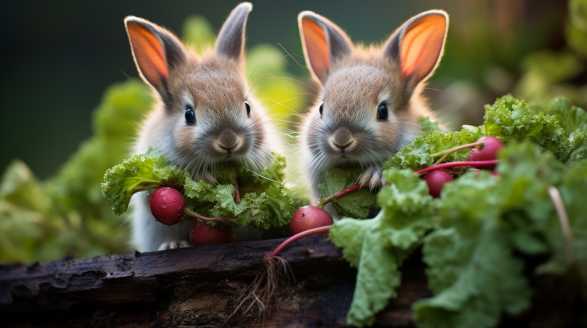
Rabbits are adorable and beloved pets for many people. However, just like any other living creature, they are susceptible to a range of diseases.
That’s why I have explored various preventive measures, and one fascinating discovery I made is the significant role Swiss chard can play in preventing rabbit diseases.
Swiss Chard: A Nutritional Powerhouse for Rabbits
Swiss chard, scientifically known as Beta vulgaris subsp. cicla, is a leafy green vegetable packed with essential nutrients.
With its rich content of vitamins, minerals, and antioxidants, Swiss chard can boost your rabbit’s immune system, helping to prevent a multitude of diseases. Let’s delve deeper into the benefits of this remarkable vegetable.
1. High in Fiber Content
Fiber is a crucial component of a rabbit’s diet. It aids in digestion, prevents gastrointestinal problems, and ensures optimal gut health.
Including this leafy green in their diet can help prevent issues like diarrhea and constipation, keeping their digestive system in prime condition.
2. Abundance of Vitamins
Swiss chard is a powerhouse when it comes to vitamins. It is particularly rich in vitamin A, vitamin C, and vitamin K. These vitamins are essential for maintaining a strong immune system, promoting healthy growth, and aiding in the healing process.
3. Mineral Richness
Apart from vitamins, Swiss chard is abundant in essential minerals like potassium, magnesium, calcium, and iron. These minerals are crucial for maintaining bone health, promoting muscle function, and preventing anemia.
How to Incorporate Swiss Chard in Your Rabbit’s Diet
Now that you understand the incredible benefits of Swiss chard, let’s discuss practical ways to incorporate it into your rabbit’s diet. Keep in mind the following guidelines to ensure a balanced and nutritious diet for your furry friends:
1. Introduce It Gradually
As with any new food, it is important to introduce Swiss chard gradually into your rabbit’s diet. Start by offering a small amount and monitor their reaction.
2. Fresh and Organic Options
Whenever possible, opt for fresh, organic Swiss chard. This ensures that your rabbits are getting the highest quality and most nutritious version of this leafy green.
3. Variety is Key
While Swiss chard is an excellent addition to your rabbit’s diet, it is important to offer a variety of other vegetables as well. This ensures a well-balanced meal and helps provide a wider range of nutrients.
4. Proper Preparation
Before feeding Swiss chard to your rabbits, it is essential to wash it thoroughly to remove any dirt or contaminants. Remove the stems and provide only the leafy green portion, as the stems can be tough and challenging for your pets to chew.
5. Moderation is Crucial
Although Swiss chard is highly beneficial for rabbits, moderation is key. It is important not to overfeed this leafy green or any other vegetable, as it can upset the delicate balance in their digestive system.
The Bottom Line: Swiss Chard as a Preventive Measure
Incorporating Swiss chard into your rabbit’s diet can be a game-changer when it comes to preventing diseases. By harnessing the power of this leafy green, you can ensure a healthier and longer life for your beloved pets.
Remember, prevention is always better than cure! So, grab some Swiss chard and provide your rabbits with the ultimate protection against diseases.
Conclusion
It has been fun! Exploring the wonders of Swiss chard and its impact on our beloved rabbits has been an adventure like no other.
And, the excitement never waned!
As a rabbit enthusiast, I couldn’t have asked for a more thrilling experience. Learning how to safely introduce Swiss chard to my furry friend’s diet, experimenting with creative recipes that incorporated this vibrant vegetable, and understanding its role in preventing diseases – I feel like a rabbit nutrition expert now!
Swiss chard is truly a gift from nature. Its nutritional content, fiber-rich composition, and immune-boosting properties make it an ideal addition to our fluffy pals’ meals.
Swiss chard should never take over their diet completely, but rather add some color, nutrients, and excitement to their daily meals.
So, my fellow rabbit enthusiasts, let us embrace the wonders of Swiss chard and make it a part of our rabbits’ lives. From feeding them a delicious Swiss chard salad delight to watching their joy as they munch on a Swiss chard hay stack, the possibilities are endless.
But hey, let’s not stop here! The world of rabbit nutrition is vast and ever-evolving.
So let’s keep hopping on this journey together, discovering new flavors, and ensuring the health and happiness of our beloved bunnies.
Thank you for joining me on this adventure! I hope you and your fluffy companions have found this article informative, inspiring, and, dare I say, exciting.
Happy rabbit feeding, my friends!
Frequently Asked Questions
Can rabbits eat Swiss chard?
Yes, rabbits can eat Swiss chard. It is safe and healthy for them to consume in moderation.
Is Swiss chard toxic to rabbits?
No, Swiss chard is not toxic to rabbits. However, it is important to introduce new foods slowly and in small quantities to avoid digestive upset.
How should I prepare Swiss chard for my rabbit?
Before feeding Swiss chard to your rabbit, make sure to rinse it thoroughly to remove any dirt or pesticides. Remove any wilted or damaged leaves and cut the chard into smaller pieces for easy consumption.
How much Swiss chard can I feed my rabbit?
Swiss chard should be given as a treat and not comprise more than 10% of your rabbit’s daily diet. Introduce it gradually and monitor your rabbit’s reaction.
Are there any risks or side effects of feeding Swiss chard to rabbits?
While Swiss chard is generally safe for rabbits, overfeeding can lead to diarrhea or digestive problems. Always introduce new foods slowly and in moderation to avoid any potential issues.
Can rabbits eat both the leaves and stems of Swiss chard?
Rabbits can eat both the leaves and stems of Swiss chard. Both parts of the plant are nutritious and safe for consumption.
Are there any alternatives to Swiss chard for rabbits?
Yes, there are several leafy greens that you can offer as alternatives to Swiss chard. Some options include kale, spinach, romaine lettuce, bok choy, and parsley. Remember to introduce any new greens gradually and observe how your rabbit reacts to them.
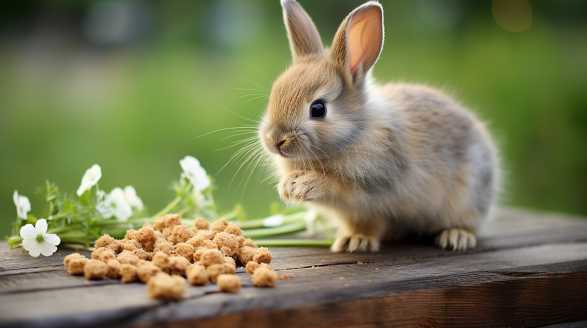
Can Rabbits Eat Alfalfa Pellets
Introduction Hey there, rabbit lovers! Are you looking for the best way to keep your furry friends happy and healthy? we’re diving into the wonderful world of alfalfa pellets and how they can benefit your beloved rabbits. As a long-time rabbit owner and enthusiast, I understand the importance of providing the right nutrition for our […]
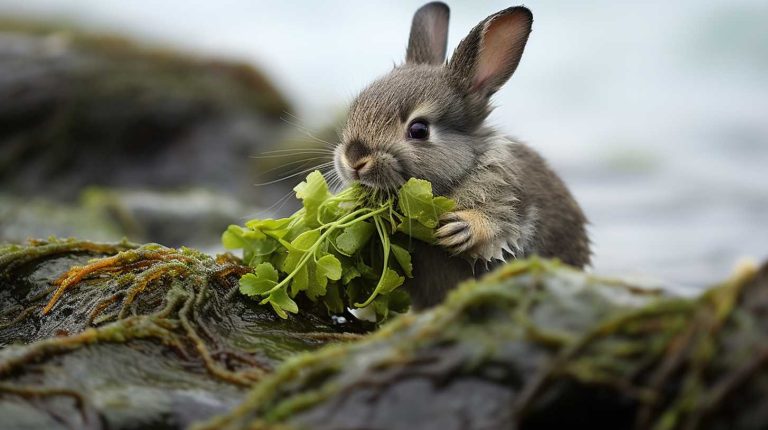
Can Rabbits Eat Seaweed
Introduction Hey there, rabbit owners! As fellow bunny enthusiasts, we know how important it is to provide our furry friends with a wholesome and nutritious diet. Yes, you heard it right – seaweed! You might be wondering, “Seaweed for rabbits? Is that even safe?” Well, we’ve done our research and we’re here to give you […]
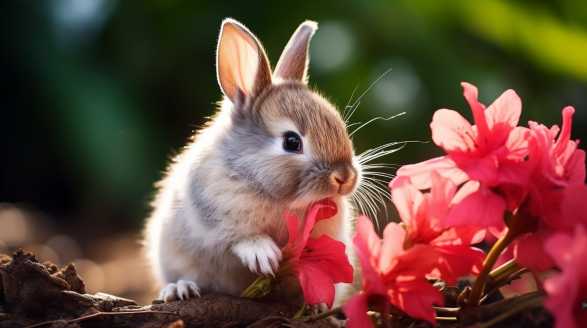
Do Rabbits Eat Hibiscus
Introduction Hey fellow rabbit lovers! Are you curious about hibiscus and how it affects our furry friends? we’re going to dive deep into the world of hibiscus and its impact on rabbits. From allergies to digestion, we’ll cover it all. We’ll begin by exploring hibiscus allergies in rabbits. Did you know that some rabbits can […]
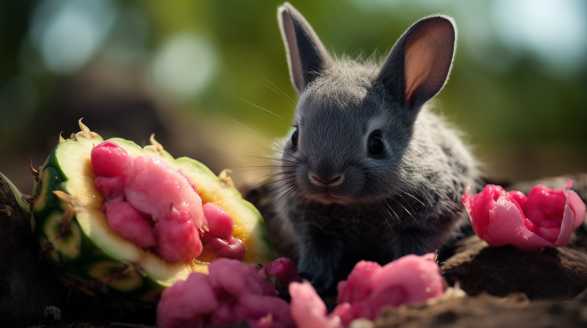
Can Rabbits Eat Dragonfruit
Introduction Can Rabbits eat dragonfruit? Let’s find out. Dragons and rabbits coming together through the magical world of fruit. Who knew? Now, let’s pause for a moment and imagine the possibilities. Dragonfruit, with its vibrant hues and exotic taste, has captivated the hearts of fruit enthusiasts around the globe. Well, my friends, today I am […]
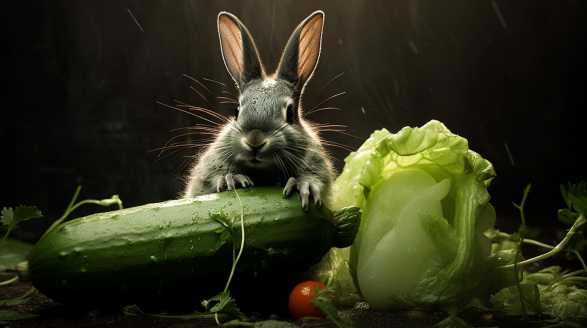
Can Rabbits Eat Cucumbers
Introduction Hey there, fellow bunny lovers! Are you ready to dive down the rabbit hole of cucumbers and their impact on our furry friends? Let’s find out, can rabbits eat cucumbers? Picture this: a world where your bunnies not only enjoy munching on their favorite treats but also stay hydrated, healthy, and have a smile […]
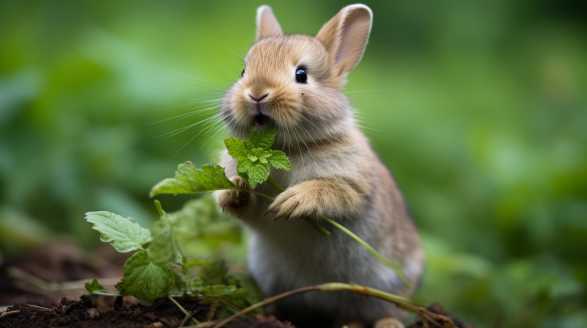
Can Rabbits Eat Mint
Introduction Can Rabbits eat mint? Find out in this comprehensive guide. Mint treats are not only incredibly tasty for rabbits, but they also offer numerous health benefits. So, get ready to pamper your bunnies and make their taste buds jump for joy with these amazing mint treat recipes! I don’t know about you, but whenever […]
